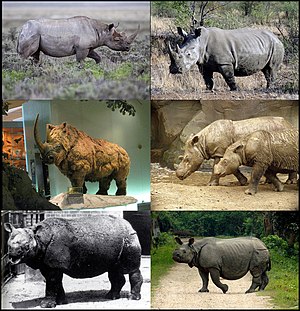Rhinocerotidae (family): Difference between revisions
No edit summary |
No edit summary |
||
| Line 1: | Line 1: | ||
[[File:Rhinocerotidae-01.jpg|alt=Rhinocerotidae|thumb|Rhinocerotidae ]] | |||
The Rhinocerotidae family, commonly known as [[Rhinoceros|rhinoceroses]], is a group of large, herbivorous mammals that are characterized by their distinctive horned snouts and formidable size. They belong to the order Perissodactyla, which also includes horses and tapirs. Rhinoceroses are known for their prehistoric origins and their remarkable adaptations to different habitats. | The Rhinocerotidae family, commonly known as [[Rhinoceros|rhinoceroses]], is a group of large, herbivorous mammals that are characterized by their distinctive horned snouts and formidable size. They belong to the order Perissodactyla, which also includes horses and tapirs. Rhinoceroses are known for their prehistoric origins and their remarkable adaptations to different habitats. | ||
Revision as of 11:32, 11 July 2023

The Rhinocerotidae family, commonly known as rhinoceroses, is a group of large, herbivorous mammals that are characterized by their distinctive horned snouts and formidable size. They belong to the order Perissodactyla, which also includes horses and tapirs. Rhinoceroses are known for their prehistoric origins and their remarkable adaptations to different habitats.
Taxonomy and Classification
The family Rhinocerotidae consists of five extant species, all of which belong to the same genus, Rhinoceros. These species are:
- Indian Rhinoceros (Rhinoceros unicornis)
- Javan Rhinoceros (Rhinoceros sondaicus)
- Sumatran Rhinoceros (Dicerorhinus sumatrensis)
- Black Rhinoceros (Diceros bicornis)
- White Rhinoceros (Ceratotherium simum)
